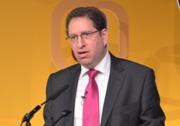Apprenticeships – improving choices

In 2013 the Prime Minister set out his aspiration that all young people would be able to take a path that would lead them to either an Apprenticeship or a University degree. As someone who has worked in the vocational training sector for some years, this for me was a very powerful message. It was a message that could be delivered by the Prime Minister because the quality and scope of the current Apprenticeship programme is now at a high point in its history. We now have a high quality all age, all level programme across all sectors of the UK economy.
Recently there has been a growing focus on Higher Apprenticeships which provide a new route to high level skills at the same level as degrees and masters degrees. This new focus means that there is a real choice not just for young people leaving school but for everyone in the workforce who wants to develop their skills through a structured programme.
This new found focus on vocational career development routes has also brought some confusion in terminology with people writing about the choice between an Apprenticeship and a degree. Clearly that is not the choice people need to make. An increasing number of apprentices will go on to do a degree or will do degree level qualifications such as accountancy. Now that people have different options and routes to higher level skills, we need to resolve the language and terminology so that we can explain those options clearly.
What we don’t want to do is to set up a simple either or debate about whether Apprenticeships are better than University as for most this is not the choice. Increasingly they are options at different times in people’s career development. It is also not a choice between academic or vocational as many academic courses are part of a very vocational ‘apprenticeship’. I hope doctors combine academic and vocational practice as part of their programmes because I certainly know that all Apprentices have to learn the theory of their occupational skills and have to sit multiple tests and exams.
So while I understand the political and marketing simplicity of the message and the positive power of the Prime Minister’s support, it is not a simple choice we are offering. We want to create an environment where everyone, particularly young people, has real choices of equally positive options that include Traineeships where they are not yet ready for an Apprenticeship, self employment and let us not forget a job with companies that cannot yet offer an Apprenticeship.
We are making some real progress and we are working with many partners to make that work including UCAS Progress who already provide a full range of information for young people making their choices not just for those going to university. This is something AELP have been pushing for some years when investment has tended to be put behind improving the offer for those following a university route.
At a time when the participation age will be raised in 2015, it is more important than ever that young people, their parents and employers get the right information about the choices they have. I have already seen institutional explanations of the RPA that give the impression that young people have to stay on at school. We need a much better campaign to inform people of the real choices that include study at other institutions, volunteering a job, a Traineeship and an Apprenticeship.
It also means that it is really important that changes to the Apprenticeship programme support this new goal and we have to ensure that direct funding for employers and mandatory cash contributions do not create a barrier to giving our young people the choice of high quality routes to a successful career.
We have a real chance to begin to change the culture of our education system that has not valued the work based route to success and training providers including FE Colleges have a very important part to play.
Stewart Segal is chief executive of the Association of Employment and Learning Providers











Responses